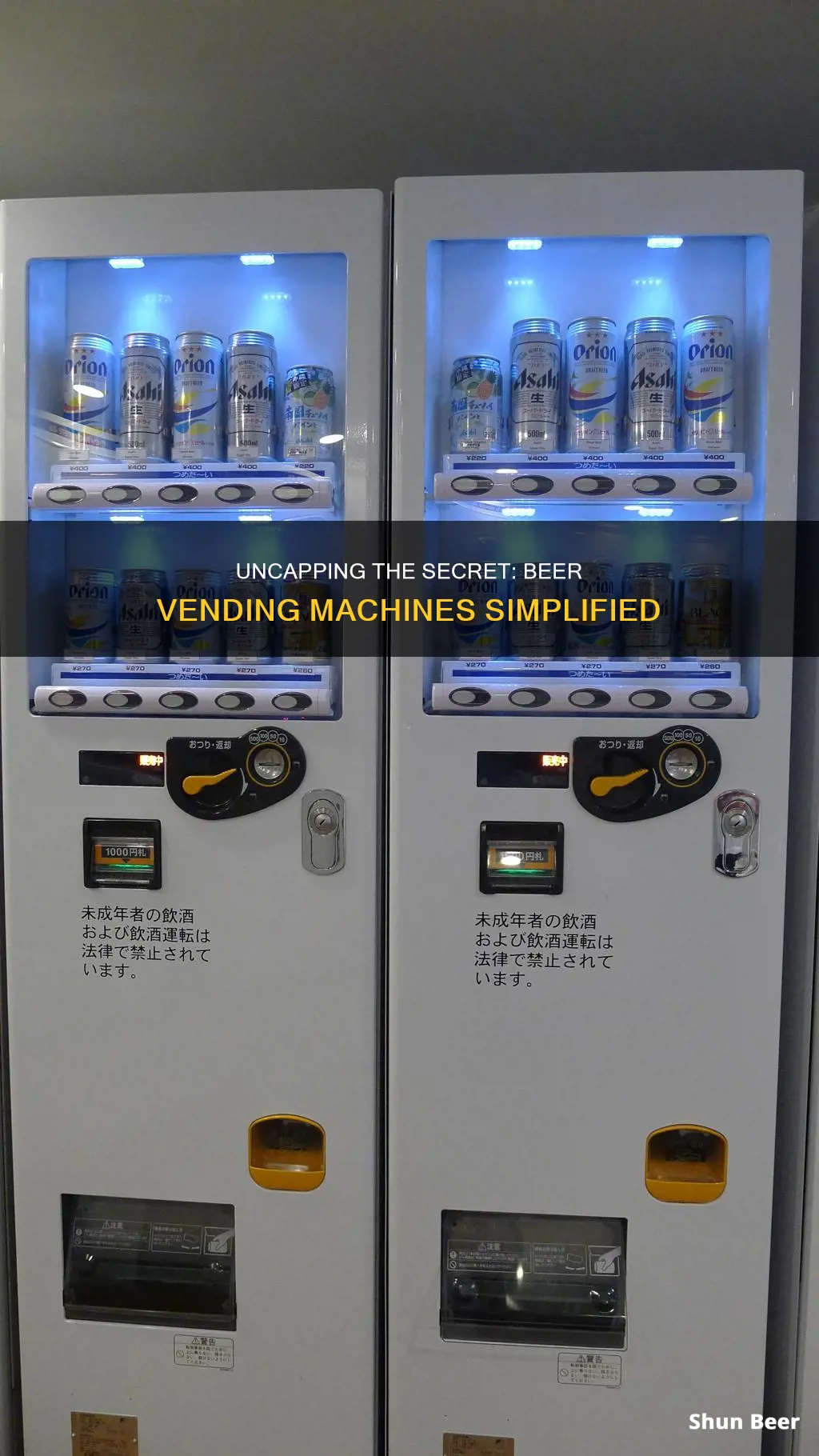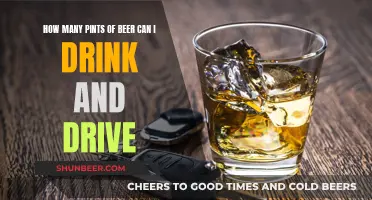
Beer vending machines are automated beer dispensers that are often used in large venues and establishments such as hotels, airports, bars, and restaurants. These machines typically use advanced age verification systems, such as finger vein biometrics, to ensure that only individuals of legal drinking age can purchase beer. While beer vending machines offer convenience and a unique experience for customers, they also face challenges related to age verification and legal issues, with regulations varying across different states and countries.
What You'll Learn
- Age verification: biometrics, pre-registration, ID cards, and smartphone-based license checks
- Licensure rules and state regulations
- Security measures: key fobs, fingerprints, and government-issued ID cards
- On-licenses: drinks must be consumed onsite
- Location: some states prohibit alcohol vending machines

Age verification: biometrics, pre-registration, ID cards, and smartphone-based license checks
Beer vending machines are not your ordinary vending machines. They are age-verification beer-dispensing systems that use advanced technology to ensure that only those of legal drinking age can purchase alcohol. Here are some of the age verification methods employed by these machines:
Biometrics
Biometric age verification is a highly secure method that uses an individual's unique biological traits to confirm their identity and age. In the context of beer vending machines, this can involve fingerprint scanning or finger vein recognition. For example, the Vendweb Beer Vending Machine uses finger vein biometrics to ensure that the person attempting to purchase alcohol is of legal age and is the same person registered in the system. Biometric age verification offers a high level of accuracy and security, making it difficult for minors to circumvent.
Pre-registration
Pre-registration is another essential component of age verification for beer vending machines. Individuals must first register their personal information, including government-issued ID and biometric data, before being granted access to the machine. This process ensures that only authorised users can purchase alcohol and provides an additional layer of security.
ID Cards
ID cards, such as driver's licenses or official state-issued identity cards, are commonly used for age verification. These cards contain an individual's date of birth and other relevant information, which can be scanned and verified by the vending machine. The use of ID cards ensures that only those who can provide valid proof of age can access the beer vending machine.
Smartphone-based License Checks
With the widespread use of smartphones, age verification can also be conducted through mobile applications. These apps typically require users to upload a photo of their driver's license or ID card, which is then verified by the system. Additionally, facial recognition technology can be employed, where users take a selfie that is compared to the photo on their official identification document. This two-factor authentication ensures that the person attempting to access the beer vending machine is indeed the authorised individual.
The combination of these age verification methods ensures that beer vending machines can effectively prevent underage individuals from accessing alcohol. By utilising biometrics, pre-registration, ID cards, and smartphone-based license checks, these vending machines provide a secure and controlled environment for the sale of alcoholic beverages.
Beer Science: Brewing Chemistry and History Podcast
You may want to see also

Licensure rules and state regulations
Licensure Rules:
Before installing a beer vending machine, it is imperative to obtain the necessary licenses and permits as outlined by the relevant authorities. This includes securing a seller's permit, which allows for the operation of multiple vending machines. However, it is important to note that there are exemptions to this rule, such as when the products sold are 15 cents or less, or in cases of non-taxable vending machine sales.
To ensure compliance with age restrictions, it is essential to incorporate age verification mechanisms into the vending machine. This can be achieved through the use of finger vein biometrics, ID authentication, or facial recognition technology. By doing so, the machine can confirm that the user is of legal drinking age, which is typically 21 years old in the United States.
State Regulations:
State and local authorities have the authority to regulate the sale and use of liquor, including beer. As a result, the legality of beer vending machines can vary from one jurisdiction to another. For instance, Pennsylvania permits the sale of alcohol for home consumption only from state-owned establishments, while states like Florida and California allow the use of liquor vending machines with the appropriate licensing.
It is important to thoroughly research the specific regulations and restrictions of your state before investing in a beer vending machine. These regulations may include limitations on the locations where vending machines can be placed, such as schools, and the types of items that can be sold. Additionally, some states, like Arizona, have tightened their vending regulations to address concerns related to childhood obesity.
In conclusion, to operate a beer vending machine successfully and legally, it is crucial to adhere to the licensure rules and state regulations governing the sale of alcohol. By staying informed and compliant with these regulations, you can ensure a smooth and legal operation while providing a convenient service to your customers.
Beer's Anti-Inflammatory Benefits: Fact or Fiction?
You may want to see also

Security measures: key fobs, fingerprints, and government-issued ID cards
Beer vending machines are not a new concept, but their implementation has been limited due to the challenge of verifying a customer's age. To address this, some beer vending machines now employ security measures such as key fobs, fingerprints, and government-issued ID cards to ensure that only those of legal drinking age have access.
La Galere Markets, a company in Miami-Dade, Florida, proposed the installation of beer and wine vending machines in residential condominium buildings. To address concerns about underage drinking, they suggested using three layers of security, including pre-registration of customers using government-issued ID cards and biometric data. This could include fingerprint or finger vein biometrics, ensuring that only authorised individuals can access the machine.
Key fobs can also be used as a security measure. For example, in the case of La Galere Markets, they proposed that only pre-registered residents would be able to access the machines using key fobs, in addition to fingerprint verification. This two-factor authentication further enhances the security of the vending machine.
The use of government-issued ID cards is another security measure that can be employed. By requiring customers to register with their ID cards before using the machine, the vending machine operator can verify that the customer is of legal drinking age. This can be done in combination with other security measures, such as fingerprint or key fob authentication, to add an extra layer of security.
These security measures are designed to address concerns about underage drinking and ensure that beer vending machines are operated in a safe and responsible manner. By utilising these advanced security systems, vending machine operators can restrict access to authorised individuals and prevent unauthorised use.
Beer Chillers: How Do They Work?
You may want to see also

On-licenses: drinks must be consumed onsite
On-licenses are required for businesses that sell alcohol to be consumed on-site. This includes cafes, bars, pubs, discos, restaurants, hotels, and nightclubs. The requirements for obtaining an on-license vary depending on the location and the specific activities of the business. For example, in Chicago, establishments like bars, nightclubs, and pubs that primarily sell alcohol for on-site consumption require a Tavern license. On the other hand, restaurants, hotels, and banquet halls that sell alcohol as a secondary activity need a Consumption on Premises-Incidental Activity (COP) license.
In some places, like France, there are different types of on-licenses depending on the nature of the beverages being sold. For instance, License III is required for drinks with less than 18% alcohol content, such as wine and beer, while License IV is necessary for drinks with more than 18% alcohol content, including distilled alcohols.
It is worth noting that the sale of alcoholic beverages through vending machines is prohibited in France. However, in the United States, specifically in Florida, there has been a push to allow beer and wine vending machines, particularly in residential buildings. These vending machines would employ advanced age verification technology, such as biometric data and key fobs, to ensure that only registered residents over the legal drinking age can access the alcohol.
Beer for Slugs: Does It Work?
You may want to see also

Location: some states prohibit alcohol vending machines
Beer vending machines are not a new concept, but their availability is limited. One of the main challenges of implementing beer vending machines is the inability to verify the user's age. This has led to concerns about underage drinking and has likely contributed to the limited availability of beer vending machines, especially in the United States.
In the US, the legal drinking age is 21, and it is illegal to sell or provide alcohol to minors. To address this issue, some manufacturers have incorporated scanners into their vending machines to verify identification. Others have proposed more low-tech solutions, such as requiring the purchase of tokens that would only be sold to those over 21 or having someone stand nearby to check IDs.
While some states have embraced the idea of beer vending machines, others have explicitly prohibited them. For example, in Connecticut, self-serve dispensers were once illegal until state representative David Arconti introduced legislation in 2016, allowing "self-pouring technology." This change in legislation paved the way for beer vending machines in the state.
On the other hand, some states have strong opposition to the concept. Florida has witnessed a legal battle over the proposal to install beer and wine vending machines in condominium buildings. While a court initially ruled that state beverage regulators were wrong to deny the proposal, citing that nothing in Florida law explicitly prohibited the sale of alcoholic beverages through vending machines, the Florida Beer Wholesalers Association argued that it could create a "slippery slope." They warned that it might lead to scenarios where alcohol could be purchased from warehouse locations supervised only by technology. This concern highlights the ongoing debate and the need for clear and effective regulations to address the potential risks associated with alcohol vending machines.
Beer Growlers: How Do They Work?
You may want to see also
Frequently asked questions
Beer vending machines use various methods to verify age, including finger vein biometrics, government-issued ID cards, and biometric data. Some companies are exploring smartphone-based license verification procedures, while others suggest checking IDs at the door.
Beer vending machines can be found in various locations, including large venues, condominium buildings, hotels, airports, bars, restaurants, and festivals.
Beer vending machines offer a convenient source of revenue for establishments, speed up service, and provide a unique and fun experience for customers. They can also help boost service rates and sales numbers with minimal dedicated floor space.
Yes, the main issues with beer vending machines are age verification and legal complications. Licensure rules, state regulations, and other legal issues can hinder the installation of beer vending machines.







